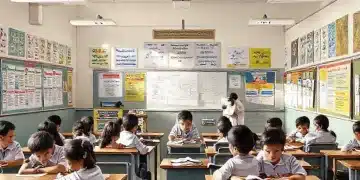Georgia school politics spotlight: what’s happening now

Georgia school politics spotlight reveals significant challenges including funding disparities, curriculum changes, and the need for mental health awareness, all while trends like technology integration and personalized learning shape the future of education.
Georgia school politics spotlight is shining brighter than ever, revealing a host of pressing issues that affect students and educators alike. Curious about what’s unfolding in your local schools? Let’s take a closer look.
Current challenges in Georgia’s school politics
Current challenges in Georgia’s school politics are numerous and complex. Understanding these issues is crucial for parents, educators, and policymakers. As we dive into the major challenges, it’s clear that the decisions made today will impact the future of education in our state.
Funding Disparities
One of the most pressing issues facing Georgia schools is funding disparities. Schools in wealthy areas often receive significantly more funding than those in underprivileged communities.
- Unequal tax revenues contribute to this gap.
- State funding formulas can disadvantage lower-income districts.
- Consequences include fewer resources for students.
The lack of equitable funding leads to a cycle where lower-income schools struggle to provide adequate educational services.
Teacher Retention
Another critical challenge is teacher retention. Many educators are leaving the profession due to burnout and low pay. The high turnover rates seriously affect student learning.
- Teachers seek better conditions and salaries elsewhere.
- School districts must address working conditions.
- Professional development opportunities can help retain talent.
Investing in our teachers is essential for maintaining a stable and experienced workforce.
Moreover, issues such as curriculum changes and political influences on educational content can disrupt learning. The introduction of controversial topics often leads to heated debates, which can distract from the core mission of schools—educating children.
Furthermore, the impact of recent legislation on education is also a source of concern. Policies that restrict discussions around specific topics can limit teachers’ ability to provide comprehensive education as they see fit.
Key players influencing education policy
Understanding the key players influencing education policy in Georgia is essential for grasping the current landscape of school politics. Various stakeholders play significant roles in shaping decisions that affect students, teachers, and schools.
School Boards
School boards are crucial in determining education policies at the district level. They often make decisions on budgets, curriculum, and hiring practices.
- Members are typically elected by the community.
- They represent the voices of parents and local residents.
- School boards can face challenges with public opinion and political pressures.
These boards are responsible for developing policies that align with state and federal regulations while also reflecting the needs of their communities.
State Legislators
State legislators have a powerful impact on education policy through the laws they create. Their decisions can alter funding levels and determine key educational standards.
- Legislation can influence curriculum requirements.
- Funding decisions can affect resource allocation.
- They serve as advocates for educational change.
Legislators work closely with education organizations to address various issues, including teacher pay and student performance metrics.
Additionally, advocacy groups play an essential role in shaping policy discussions. Organizations focused on education reform often lobby for changes that benefit students and teachers. They gather data and conduct research to support their proposals and push for legislative action.
Moreover, the community itself, including parents, students, and local organizations, shapes the dialogue around education policies. Their feedback and activism are pivotal in influencing school board meetings and legislative sessions.
Recent controversies in school board decisions

Recent controversies in school board decisions have sparked significant discussions among parents, teachers, and the community. These debates often revolve around critical issues that affect the education system and its stakeholders.
Curriculum Changes
One major area of controversy involves changes to the curriculum. Many school boards are reevaluating what is taught in classrooms, leading to strong opinions on both sides.
- Some parents advocate for more inclusive history lessons.
- Others argue against certain topics they find inappropriate.
- Debates can lead to protests and heated discussions at school board meetings.
These changes are often proposed to align with new educational standards or to better reflect the diversity of the student population.
Budget Allocations
Another heated discussion point is budget allocations. School boards face tough choices on where to spend limited funds.
- Teachers often push for increased salaries and resources.
- Some community members demand more funding for arts programs.
- Others prioritize sports and extracurricular activities.
Budget decisions can lead to controversy, especially if certain programs are cut or reduced, leading to community backlash.
In addition to curriculum and funding issues, policies affecting student behavior and discipline are also hot topics. Recent changes in how schools handle disciplinary actions have raised concerns among parents.
When penalties for misbehavior are viewed as too lenient or too harsh, it can lead to community debates and calls for transparency.
These controversies reflect the deeper values and priorities of the community, showing how much residents care about educational outcomes. As school boards navigate these challenges, they must balance differing viewpoints while striving to support all students.
Impact of state policies on local schools
The impact of state policies on local schools is profound and far-reaching. Policies set by state legislatures directly affect everything from funding to curriculum choices in schools across Georgia.
Funding Models
One key area is funding. State policies determine how resources are allocated to different districts. These funding models can greatly influence a school’s ability to provide essential services.
- Schools in affluent areas often enjoy better funding.
- State policies may unintentionally widen the gap between rich and poor districts.
- Inadequate funding can lead to larger class sizes and fewer support services.
This imbalance creates challenges for underfunded schools, affecting students’ learning experiences and outcomes.
Curriculum Standards
State policies also dictate curriculum standards. These standards influence what subjects are taught and how they are implemented in the classroom.
- Changes in policy can lead to rapid curriculum updates.
- Teachers need adequate training to adapt to these changes.
- Policies that promote a diverse curriculum can enhance student engagement.
Schools often struggle to keep pace with these changes due to the need for professional development and resource updates.
Moreover, state policies regarding testing and accountability shape how local schools measure success. Required standardized testing can put pressure on schools to improve scores, sometimes at the expense of a well-rounded education.
Additionally, state decisions about teacher qualifications and evaluation methods play a significant role in staffing local schools. Stringent requirements can make it more challenging to attract and retain qualified teachers in certain areas.
Overall, state policies have a cascading effect on local schools, ultimately impacting the quality of education students receive.
Future trends in Georgia’s educational landscape
The future trends in Georgia’s educational landscape are shaping how students learn and teachers teach. As society evolves, so do the demands and expectations placed on schools.
Emphasis on Technology
One significant trend is the increasing emphasis on technology in education. Classrooms are becoming more digital, with interactive learning tools being utilized to enhance student engagement.
- Schools are increasingly incorporating computers and tablets into lessons.
- Online resources and educational apps are becoming common.
- Teachers are receiving training to effectively use technology in their teaching.
This shift helps prepare students for a technology-driven workforce and enhances their learning experiences.
Personalized Learning
Another emerging trend is personalized learning. Schools are starting to recognize that each student learns differently. As a result, personalized learning plans are being developed to meet individual student needs.
- Teachers are using assessments to tailor instruction.
- Students can progress at their own pace, benefiting from targeted support.
- Learning strategies are becoming more flexible and student-centered.
This approach aims to improve outcomes by recognizing and supporting diverse learning styles.
In addition to technology and personalized learning, there is also a growing focus on mental health and wellness in schools. With the challenges students face, schools are increasingly incorporating programs that support mental health.
More resources are being dedicated to social-emotional learning to help students cope with stress and build resilience. Teachers are being trained to recognize signs of mental health issues and provide the necessary support.
Furthermore, there is a strong push for inclusivity and diversity in educational practices. Schools are striving to create environments where all students feel valued and included.
This commitment to diversity is leading to a broadening of curricula to include multiple perspectives and cultural experiences, preparing students for a global society.
FAQ – Frequently Asked Questions about Georgia School Politics
What are the main challenges facing Georgia schools today?
Key challenges include funding disparities, curriculum changes, and teacher retention, all of which significantly impact the quality of education.
How is technology changing education in Georgia?
Schools are integrating technology to enhance learning, using tools such as tablets and online resources to engage students more effectively.
Why is mental health awareness important in schools?
Mental health awareness helps students cope with stress and emotional challenges, creating a supportive environment for learning and personal growth.
What role do parents play in Georgia school politics?
Parents are crucial in advocating for their children’s education, influencing school board decisions, and participating in community discussions about educational policies.





